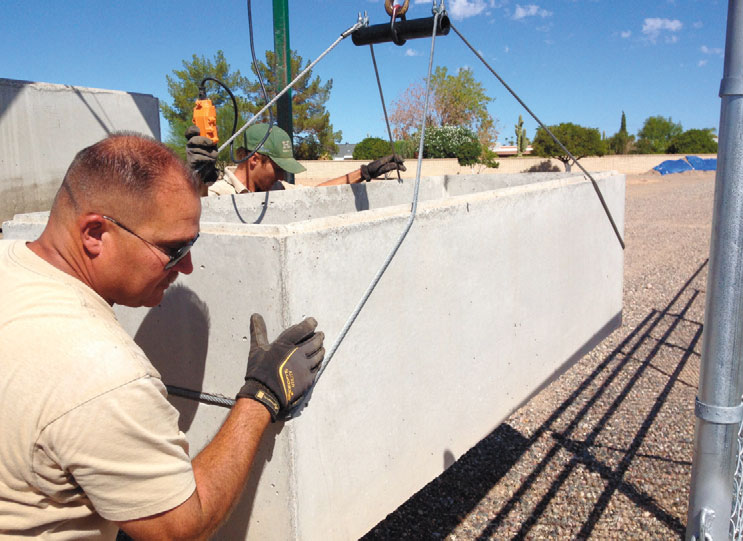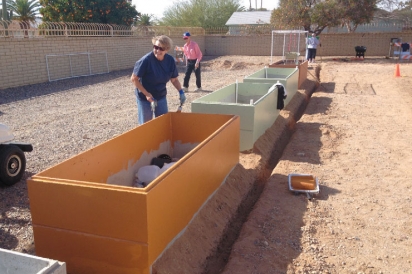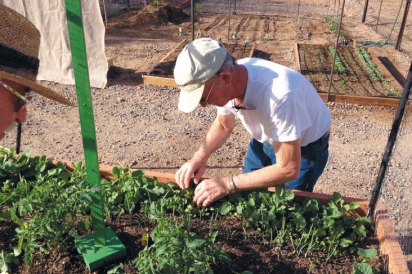Swords to Plow Shares
GRAVE LINER GARDENS BRING NEW LIFE TO RETIREMENT COMMUNITY
At age 85, Yvonne Buckley could be resting on her laurels rather than toiling away at gardening in the hot sun or helping organize events for the Garden Club of Sun City.
Back in Minnesota, she not only directed the Organic Growers and Buyers Association for years, but served on a national board that designed the Organic Food Production Act of 1990. That landmark legislation now benefits over 31,000 organic farmers and millions of consumers in America every day.
But when Yvonne became a transplant to Arizona, her boundless enthusiasm for growing, preparing and sharing fresh, healthy foods led her into a fresh initiative. She teamed up with her Sun City neighbor Larry Bilderback to revive one of the most remarkable and life-affirming community gardens in all of Arizona, if not in all of America.
Two dozen shadecloth-covered vegetable garden plots, a pollinator garden and a native desert foods garden are contained in the Garden Club’s community garden at 91st Avenue and Greenway Boulevard near the Sun City–Peoria line. But the most unusual features are the 15 wheelchair-accessible raised beds. The beds are held in brightly painted reinforced-concrete grave liners that were originally constructed to enclose and protect caskets when placed into the earth in cemeteries. But now, Yvonne and Larry are experimenting to see whether these slightly damaged “recycled” concrete grave liners have long-term value for generating new life (in the form of vegetables) and building community among Sun City seniors.
For more than four decades, Sun City East had another community garden that eventually grew to over eight-and-a-half acres, with literally hundreds of small plots. At a site adjacent to the Sunland Mortuary, the Garden Club of Sun City engaged thousands of seniors over the years in the life-giving ritual of growing food to share with others. They grew not only for their own tables but for food banks, recreational center cafeterias and their house-bound neighbors.
But then, in 2003, mounting real estate development pressures wiped the slate clean. The Garden Club lost its cherished sanctuary for fruits and vegetables as well as comradery among its elder gardeners. The grievous loss of that green touchstone devastated the community for nearly another decade.
Enter Larry and Yvonne, both recent transplants from the Midwest. Yvonne had been inspired by the many Rodale publications of the 1950s and ’60s to learn how to garden organically to nourish her five children while living on the fringe of the Twin Cities in Minnesota. Larry had grown up in Missouri during an era when every family still tended a kitchen garden out its back door, canning and sun-drying their bounty for year-round use. So when Larry retired to Sun City in 2009 he chose to devote his available time to re-engage in the very gardening activities that were part of his own agrarian upbringing.
“I guess I just wanted to get back to my roots,” he quips, “and there’s no better way than gardening.”
And so, in 2013, they convinced the Garden Club to invest in initiating a new site for their community gardening efforts. EPCOR, their water company, not only offered some land and water to jumpstart the effort, but also pitched in to promote garden education efforts.
But that is not the only potential donor that Yvonne reached out to. Hearing her pitches, other businesses offered seeds, or soil amendments. But that is not all. By chatting and sharing vegetables with the Handley family that owned Handley Precast Systems in Glendale, Yvonne had piqued the interest of the son, Steve Handley. Steve not only offered to provide the damaged (and therefore unsaleable) concrete grave liners to the Garden Club, but volunteered to deliver them to the new garden site, where they could be filled with garden soil and fitted with irrigation tubing and are the perfect height for mobility-impaired seniors.
Larry chuckles at Yvonne’s extraordinary capacity to bring people into unprecedented collaborations on behalf of gardening:
“As you can see, Yvonne is a catalyst. She’s so well-connected and so enthusiastic about this cause that people who hear her just pitch right in… I’ve been thrilled by the partnerships that Yvonne and I have been able to forge that create opportunities for our community to grow fresh vegetables here in Arizona. We not only want to see healthy vegetables on our own tables, but want them to benefit food banks, local charities, farmers markets and our neighbors.”
Needless to say, Yvonne is just as eager to praise Larry’s talents: “Larry has this special capacity to facilitate these focus groups in the Garden Club that allow everyone to play an active role in our planning and implementation processes, whether or not they use the community garden space or grow vegetables at home. We now have talented individuals involved who first learned to garden in North Carolina or Alaska or Florida. They all bring their styles of growing and maintaining gardens for the benefit of our whole group, as we try to figure out the best way to grow food in the desert. It’s that interplay of talent that Larry is so adept at nurturing.”
The Garden Club of Sun City now has around 130 members, 50 of whom regularly attend the monthly meetings in the cool-season months. While not all of them put their hands in the soil at the community garden itself, they are all human resources essential to its functioning.
Larry explains, “When it comes to solving a problem, just look at the talent we have to tap into! We have retired plumbers who can engineer and maintain our irrigation system, accountants who can do the books and lead us into sound financial planning, as well as educators and horticulturists or event planners. They’ve been collectively designing the garden layout, evaluating our soil quality, setting up our relationships with food banks and stewarding our finances. In my way of thinking, such human capital is as essential as our financial capital.”
Because of the diversity of talents and traditions they hope to embrace in the Garden Club, Yvonne has been careful not to let her personal enthusiasm for all things organic overwhelm others who are not fully conversant with integrated pest management, composting, mulching and other time-tried organic strategies:
“We certainly teach those strategies and give credence to their use in our club’s guiding documents, but we let each individual find his or her own comfort zone with them. I don’t try to convert anyone. And that’s because I want to encourage the next generation of ‘young’ gardeners and leaders to step up and participate.”
You can’t help but smile and be struck with awe when a fiery octogenarian like Yvonne Lucille Buckley talks about recruiting and mentoring the younger generation of gardening talent among seniors living in an Arizona retirement community! Since I first met her on a plane between the Twin Cities and Phoenix a dozen years ago, it’s always been clear to me that Yvonne’s vision has been focused on preparing a path toward a more healthful, greener and food secure future:
“All right, young man, you’ve asked me plenty of questions about what I’ve been doing with Larry, but I need to ask you a few questions now. How is climate change going to be affecting our future options for becoming more food secure here in the desert? What native desert-adapted crops should we be growing? And how can we get the word out about the food safety concerns affecting seniors who often don’t get the best-quality vegetables to keep them healthy? How can we get some support for community gardens like our own to be able to freeze-dry freshly picked vegetables grown in fertile soil so that elders can have nutrient-rich veggies year-round? Now, let me get out my pen and paper…”
For More Information:
The Garden Club of Sun City Office is located on the west side of the Oa kmont Recreation Center at 10725 W. Oakmont Dr. in Sun City, AZ 623-875-5921 gardenclubofsuncity.org
Membership is $10 per year. Individual plots are available for an additional fee. Members can help garden in a large community garden, known as Pete's Patch, by planting vegetables for donation to local senior centers and food banks as well as their farmers’ market.







